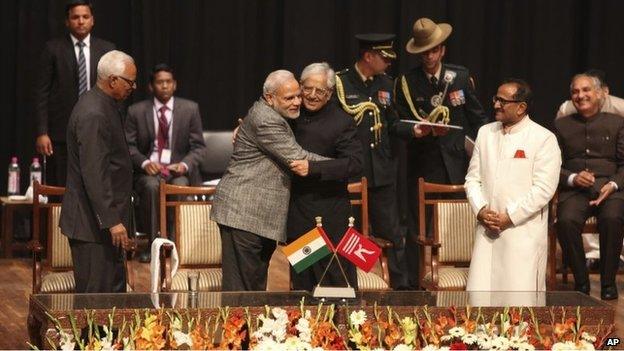Indian media praise Kashmir coalition
- Published

PM Narendra Modi attended the ceremony where Mufti Mohammad Sayeed was sworn in as Kashmir's chief minister
Papers see the alliance between India's governing Hindu nationalist BJP and the Muslim-dominated PDP in Indian-administered Kashmir as a "historic moment".
The new government was announced on Sunday as the People's Democratic Party's (PDP) Mufti Mohammad Sayeed took the oath as the state's chief minister.
The state gave a "fractured mandate" on 23 December after a fiercely fought election and no party crossed the 44-seat mark needed to form a government.
The regional PDP won 28 seats and Prime Minister Narendra Modi's Bharatiya Janata Party (BJP) came second with 25 seats.
'Status quo'
After weeks of intense negotiations, the two parties agreed to form a coalition government.
"Sunday's swearing-in showcased remarkable frames of political distance travelled, and of orthodoxies forsaken or at least shelved," says The Indian Express, external in an editorial.
Both parties have agreed to "maintain the status quo" on the controversial issue of Article 370 of the Indian constitution, which gives the state a special status and allows it to make its own laws and have greater autonomy.
The PDP wants the BJP to make its stand clear on Article 370.
The BJP has traditionally been against it, but Kashmiri parties, like the PDP, staunchly defend the state's "special status".
But papers now feel the two parties need to stay away from controversies and instead take this historic opportunity to bring peace in the region.
Kashmir, claimed by both India and Pakistan in its entirety, has been a flashpoint for more than 60 years and the South Asian rivals have fought two wars over the region.
"Both sides will need to tread delicately, but this is a brave coalition, welding together the fractured poll mandate, and turning it into an opportunity to build bridges in a state where political divides can be traced on the map," it says.
The Asian Age, external also urges the BJP-run federal government to work with the PDP to restart peace talks to solve the Kashmir issue.
"The centre should continue to speak with all sections in the valley, including the separatists, and also meaningfully engage Pakistan to explore prospects for normality," it says.
'Sensible' budget
Meanwhile, papers see India's federal budget not only as "sensible and balanced", but also as business friendly.
Among the main measures announced by Finance Minister Arun Jaitley in on Saturday's budget speech was a plan to reduce corporate tax to make it easier to do business in India.
"The budget had to support the Make in India theme of the prime minister, and what better way to attract capital and investors than by reducing taxes and easing means to do business in India," The Hindu says., external
Mr Modi launched the Make in India campaign last year in a bid to turn the country into a manufacturing hub.
The Indian Express,, external however, warns that the "budget's test will come in about six months from now".
"If investments fail to pick up, there would be no alternative, then, to taking the tough decisions (reform measures)," the paper says.
Mr Jaitley also announced a slew of welfare initiatives, such as pension for old people and health insurance for the poor in the budget.
The Deccan Herald, external says that politics, perhaps, has led the government to "present a robust agenda of social welfare and security, meant for the poorer sections, senior citizens and other weaker groups".
'Love jihad'
And finally, a member of the ruling BJP has made a controversial religious statement despite the party's warning against such remarks.
Sadhvi Prachi said on Sunday that Hindus should boycott the films of actors Shah Rukh Khan, Salman Khan and Aamir Khan as they promote "love jihad", the Hindustan Times, external reports.
In recent months, some Hindu fundamentalist groups have accused Muslim men of what they call "love jihad" - they say Muslim men romance and marry Hindu girls to convert them to Islam.
BBC Monitoring, external reports and analyses news from TV, radio, web and print media around the world. You can follow BBC Monitoring on Twitter , externaland Facebook, external.